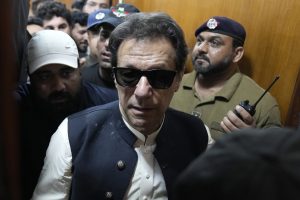Ayesha Siddiqa

Former Pakistani Prime Minister Imran Khan, center, leaves after appearing in a court, in Lahore
People in Pakistan and around the world have been sitting on the edge of their seats for months, and especially since May 9, watching intently the cricketer-turned-politician Imran Khan’s political contest with the army. There was hardly an eyebrow that didn’t lift on seeing his supporters damage military properties and attempt to forcibly enter the Army’s General Headquarters (GHQ) in protest against their leader’s arrest for an inquiry in a corruption case.
Scenes of people ransacking and torching military buildings or memorabilia are not common in Pakistan, where the armed forces have been the protagonist in power politics for decades. But after all the drama, the Khan saga seems to be moving toward a happy ending for the politically powerful army, popularly referred as the establishment.
The army turned to an old playbook: cut a recalcitrant politician down to size by attacking both the leadership and the party. The May 9 chaos has now turned into a crisis for the Pakistan Tehreek-e-Insaf (PTI) as leader after leader is either leaving the party or politics altogether. We may soon see a situation where Khan is proverbially alone – a king without a party.
What is happening in Pakistan is partly a replay of the country’s almost 76-year history and partly unprecedented. Since Pakistan’s geographical-strategic consolidation after the 1971 war with India, in which the eastern wing separated and became Bangladesh, the events of May 9 represented the biggest popular outpouring of anger against the Pakistani military. Though Imran Khan now wants to walk away from the May 9 developments and is even suggesting that his party leadership was not involved in creating chaos following his arrest, the scenes of people barging into a lieutenant general’s house in Lahore and the Army’s GHQ, or pulling down old aircraft memorabilia, denoted fury against years of the military’s overt and covert control of state and society.
Zulfiqar Ali Bhutto, the founding leader of the Pakistan People’s Party (PPP), was a populist like Khan, with a capacity to enthrall and excite people. Yet when Bhutto was imprisoned by a military government and then sentenced to death through a stage-managed court case, his party never attacked symbols of state and military power.
It is admittedly awkward to compare an intellectually smarter and sharper politician like Bhutto with Khan. That said, Khan’s ability to agitate the minds of his supporters to such a degree that they feel ready to attack the most powerful institution of the state is worth attention.
No comments:
Post a Comment